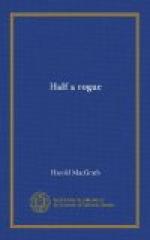Warrington seldom went to church. It was not because he was without belief; there was a strong leaven of faith underlying his cynicism. Frankly, sermons bored him. It was so easy for his imaginative mind to reach out and take the thought from the preacher’s mouth almost before he uttered it. Thus, there was never any suspense, and suspense in sermons, as in books and plays, is the only thing that holds captive our interest.
So he stayed at home and read the Sunday papers. That part not devoted to society and foreign news was given up wholly to local politics. Both the Democratic and Republican parties were in bad odor. In the Common Council they were giving away street-railway franchises; gambling-dens flourished undisturbed, and saloons closed only when some member of the saloon-keeper’s family died. The anti-gambling league had succeeded in suppressing the slot machines for a fortnight; this was the only triumph virtue could mark down for herself. There were reformers in plenty, but their inordinate love of publicity ruined the effectiveness of their work. A brass band will not move the criminal half so quickly as a sudden pull at the scruff of his neck. So the evil-doer lay low, or borrowed the most convenient halo and posed as a deeply-wronged man. Warrington, as he read, smiled in contempt. They had only one real man in town, scoundrel though he was. There are certain phases of villainy that compel our admiration, and the villainy of McQuade was of this order. The newspapers were evidently subsidized, for their clamor was half-hearted and hypocritical. Once or twice Warrington felt a sudden longing to take off his coat and get into the fight; but the impulse was transitory. He realized that he loved ease and comfort too well.
Finally he tossed aside the sheets and signaled to the dog. It was a bull terrier, old and scarred, and unchanging in his affections. He loved this master of his, even if he saw him but once a year. They understood each other perfectly. He was a peace-loving animal, but he was a fighter at times—like his master. He had a beautiful head, broad punishing jaws, and, for all his age, he had not run to fat, which is the ignominious end of all athletes, men or dogs.
“Old boy, this is a jolly bad world.”
Jove wagged his stump of a tail.
“We should all be thieves if it were not for publicity and jail.”
Jove coughed deprecatingly. Perhaps he recollected purloined haunches of aforetime.
“Sometimes I’ve half a mind to pack up and light out to the woods, and never look at a human being again.”
Jove thought this would be fine; his tail said so.
“But I’m like a man at a good play; I’ve simply got to stay and see how it ends, for the great Dramatist has me guessing.”




